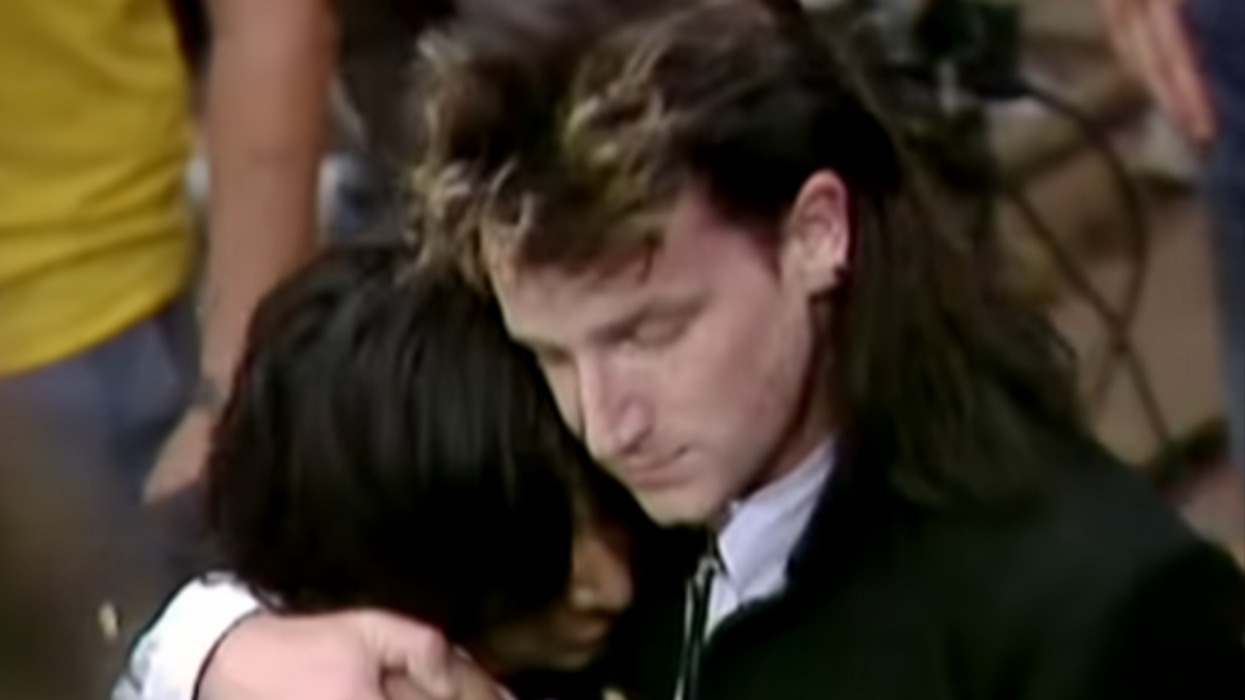By July 13, 1985, U2 was a massively popular rock band: riding the wave of two successive chart-topping U.K. albums (War and The Unforgettable Fire), even being anointed the "Band of the '80s" in a Rolling Stone cover story. But their definitive moment of that year was a performance at Live Aid, a benefit for Ethiopian famine relief staged before 72,000 at London’s Wembley Stadium and broadcast to well over 1 billion TV viewers. They were already larger than life, but now they had the perfect venue—and grandiose crowd interaction—to showcase it.
Their short set featured a 12-minute version of their atmospheric 1984 song "Bad," which they stretched out to include some quotes from The Rolling Stones’ "Ruby Tuesday" and, more famously, to accommodate the stage maneuvering of front man Bono. Halfway through the track, the singer gestured to the audience with a "come on"-type motion, eventually requesting a few female audience members be lifted out of the crowd by security. According to some accounts, including viral social media posts, this was some kind of "rescue" attempt—and while it’s unclear precisely why Bono took action, the story has become a staple of the U2 canon.
- YouTubewww.youtube.com
In the above clip, you’ll see two fans guided to the apron area in front of the stage, where Bono briefly embraces them. But the most notable moment is when he jumps into the muddy area by the barricade, asking security to hoist over a teenager, with whom he slow-dances and offers a kiss on the cheek. Cameras, of course, caught the whole thing—Bono was a showman from day one, after all.
Over the years, there’s been a lot debate and discussion about this Bono-meets-fan moment. In a detailed breakdown of the performance, Rolling Stone reports that the third fan was 15-year-old Kal Khalique. Someone by that name shared their Live Aid memories with the BBC, writing that they weren’t even at the show to see U2: "My sister and I were desperate to see Wham!, so we had made it down to the front of the stage. Half way through the day U2 came on suddenly Bono was pointing to me in the crowd and after a [number] of other girls were pulled out, he finally jumped down and got the security guys to pull me out and danced and hugged me, and I even got a kiss. I’ve been a huge U2 fan ever since."
In 2011, The Guardian cited an article by The Sun, who apparently tracked down Khalique. "The crowd surged," she reportedly claimed, "and I was suffocating—then I saw Bono." But The Guardian also notes that Bono "had long made a habit of pulling girls out of the audience and dancing with them." Was this just another example, only amplified by the drama of a hungry rock band playing the biggest stage imaginable?
- YouTubewww.youtube.com
Reasoning aside, it’s the kind of larger-than-life moment that came to define U2. It also happened at an ideal time—just ahead of their next album, 1987’s The Joshua Tree, a critically acclaimed and multi-platinum blockbuster that topped the Billboard 200 and spawned some of the bands most enduring singles, including "When the Streets Have No Name," "With or Without You," and "I Still Haven’t Found What I’m Looking For."
Live Aid also spawned one of rock’s most celebrated performances ever: Queen’s triumphant eight-track set featuring anthems like "We Are the Champions," "Radio Ga Ga," and "Crazy Little Thing Called Love." That show was even etched into film history with an exacting recreation in the 2018 Freddie Mercury biopic Bohemian Rhapsody.
- YouTubewww.youtube.com
This article originally appeared in March
















 Leonard Cohen performs in Australia in 2009.Stefan Karpiniec/
Leonard Cohen performs in Australia in 2009.Stefan Karpiniec/  Enjoying a sunset.Photo credit
Enjoying a sunset.Photo credit 
 An envelope filled with cashCanva
An envelope filled with cashCanva Gif of someone saying "Oh, you
Gif of someone saying "Oh, you
 Two penguins play by the waterCanva
Two penguins play by the waterCanva
 Counterintuitively, social media can make you feel more bored and lonely.
Counterintuitively, social media can make you feel more bored and lonely. Talking about what you’ve read can add a social dimension to what can be a solitary activity.
Talking about what you’ve read can add a social dimension to what can be a solitary activity. 
 A flight attendant closes the overhead binCanva
A flight attendant closes the overhead binCanva Gif of Larry David trying to put his luggage in overhead compartment via
Gif of Larry David trying to put his luggage in overhead compartment via 
 Dog owner pets their dogCanva
Dog owner pets their dogCanva Gif of a sad looking pug via
Gif of a sad looking pug via 

 A car with LED headlightsCanva
A car with LED headlightsCanva